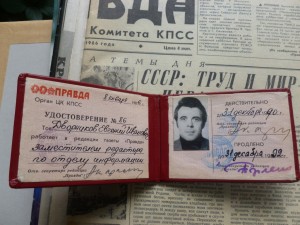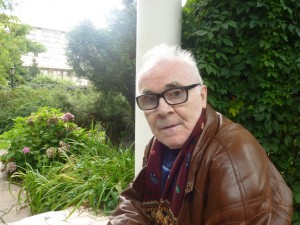“Russia is a land of poets”, declares Evgeny Dvornikov during our Moscow interview. The respected Russian poet and long-time journalist for the Soviet newspaper Pravda goes on to describe a poetry evening he organised in the 1960s, which was so overwhelmingly popular that mounted police had to be deployed to control the 30,000 strong crowd which packed the surrounding streets. This was during Khrushchev’s “Thaw”, when the tight controls of Communism were beginning to relax and personal freedoms gradually increasing. Such a gathering would not have been possible under Stalin, and Dvornikov recalls the scene with excitement and a sense of wonder: “Risssky evening…it’s hard now to explain what was cooking with our poetry…people won’t believe it, that 30,000 people were mesmerised, not by football, no, but by poetry.”
For Dvornikov there is an immediacy to poetry, which “grabs you quickly” and can express thoughts which have no other outlet. He began to write his own at university, motivated by typical student idealism – he was disillusioned by Stalin; he was angered by the way Algerian immigrants were treated in student halls. His attitude is characterised by an anecdote about a meeting of his branch of the Komsomol, the youth division of the Communist party. They passed a motion raising the wages of the cleaning staff, despite having neither the money nor the power to effect this change.
His youthful idealism fell foul of the censors, and his first attempt to get published was not a success. He describes the moment when the editor of the newspaper took him aside, sat him down and kindly explained that they could not publish his poems for “political reasons”. “I was young, I was crying…painful, painful,” he repeats, “I couldn’t write poetry again for several years.” And is it still painful? “No,” he chuckles, “no it was a long time ago now.”
As he tells me these stories, Dvornikov’s intense gaze never leaves my eyes; he is clearly used to commanding the full attention of his listeners. His eyes are framed with very dark glasses, which stand out against his very white hair. He has the charisma of a film star, and he did once appear in a film. Though his love is for journalism rather than acting, he sees a parallel between the two. A good interviewer must try to enter into the mind of the interviewee, to see the world how they see it, in order to

The official Pravda badge which secured Dvornikov all the help he might need in pursuing a story. Photo by Author.
build a natural rapport. That may be why there is something theatrical about his intense, lyrical way of speaking, packed with poetic descriptions of his own feelings. As one experienced journalist to a youthful one, he impresses on me the need to remember all the little details. “This man”, he tells me at one point, “had yellow boots on. I will always remember, bright yellow boots.”
He may have an eye for detail, but in his earlier years Dvornikov had no control over the stories he covered or the angle he went for. He was never openly dictated to, but on pitching an idea, he would be asked, “You understand how this smells, don’t you?” This was a hint that there was no need to write this story, that this was a viewpoint better not to express. Despite this, he remembers his career with enthusiasm, explaining, “A journalist must always be hungry, be thirsty for experiences. I was thirsty. I wanted to see everything with my own two eyes.”
Once Gorbachev came to power in 1988, Dvornikov was allowed more freedom. One of the first articles he was able to pitch actually elicited a phone call from Gorbachev himself, praising the journalist who wrote it. “My editor was pleased”, says Dvornikov with a mischievous smile. Yet the editor’s peace of mind doesn’t seem to have ever been on top of Dvornikov’s priority list, and his “happiest times” were when the phone didn’t ring. This was when he had time to follow his instincts and sniff out a real story, thinking, as he puts it, “aha, here might be mushrooms.”
Mushroom collecting is a popular pastime in Russia, particularly with children, and the forests provide many delicious varieties of this favourite snack. His metaphor perfectly captures his childlike enthusiasm for the hunt, for which he has been rewarded by the unearthing of many unassuming but delicious little tales. I wish I had had time to hear more, but I’m already inspired by what I’ve heard. From now on, I’m determined to wake up and smell the mushrooms.




